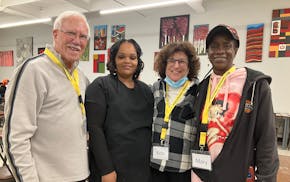Peter Frampton wasn't teasing when he undertook his Finale Tour in 2019. After being diagnosed with a degenerative muscle disease, the veteran British rock star didn't think he'd remain proficient on guitar. But the notion that "Frampton Won't Come Alive Again" is greatly exaggerated.
"I'm grateful I'm still able to play," said the singer/guitarist, who brings his Never Ever Say Never Tour to the State Theatre on Monday. "Music is my life. This is now my 60th year of touring as a professional musician. I first went on the road when I was 14."
There are some concessions to his inclusion body myositis (IBM). The biggest impact is on Frampton's legs: He walks with a cane and performs while seated.
His fingers are "weakened" but "know what to do. It's affected the amount of power I have. So for bending notes and things like that, I've adapted so I can still do it," he said last week from his longtime Nashville home.
He thinks his guitar playing is "in some ways better. There's less notes but more soul. Every note I play now has much more meaning."
While he notices a difference, Frampton says audiences don't. "Then I'm faking it good," he said with a chuckle.
On tour, the rocker is offering a career retrospective, reaching back to his days with the band Humble Pie, revisiting such solo hits as "Baby, I Love Your Way" as well as offering some instrumentals representative of his recent albums.
Those instrumental records — especially 2006′s "Fingerprints" that gave him his first Grammy — have been integral to fortifying Frampton's reputation as an estimable guitarist.
After 1976′s blockbuster concert album "Frampton Comes Alive," he became viewed as a pretty boy rock star. His cred as a guitarist was largely overlooked until 1987 when David Bowie — who Frampton met in grammar school (Frampton's father was David's art teacher) — enlisted Frampton as lead guitarist on his "Never Let Me Down" album and Glass Spider Tour.
"I realized he'd given me this huge gift of a career bump by taking me around the world for five, six months, and reintroduced me as the guitar player," Frampton said. "It changed the trajectory of my career from that point on."
Talk box tale
One of the keys to Frampton's solo success was his use of the talk box, a device that enabled him to sing through his guitar via a plastic tube. He discovered the apparatus during a 1970 recording session in England for George Harrison's "All Things Must Pass."
Between takes, Nashville session ace Pete Drake demonstrated a little homemade contraption that allowed him to sing via his pedal steel guitar.
"I almost freaked out," Frampton recalled. "I said 'I have to have one.'"
It turned out that Drake's wife soon lent the one-of-a-kind little toy to Joe Walsh, who used it to record "Rocky Mountain Way." A manufacturer was found for Drake's invention, and Frampton got his talk box for Christmas 1973.
Frampton's use of the talk box on the tunes "Do You Feel Like We Do" and "Show Me the Way" pushed "Frampton Comes Alive" to the top-selling album of 1976 and a landmark concert record.
However, he got dismissed as the Farrah Fawcett of rock, thanks to his pinup covers on Rolling Stone magazine and "I'm in You," a studio album rushed out in 1977.
"I think my looks have always gotten in the way," said Frampton, who turns 74 this month, "and thank God they don't get in the way now."
To make matters worse, in 1978 Frampton starred as Billy Shears in a widely panned movie of "Sgt. Pepper's Lonely Hearts Club Band," which received an 11% on Rotten Tomatoes.
Maybe those missteps have kept Frampton from being nominated for the Rock & Roll Hall of Fame until this year, even though he's been eligible since 1997.
"It was a surprise, to say the least," he said of the nomination.
He appreciates that Sheryl Crow invited him to perform with her last fall at her Rock Hall of Fame induction, perhaps reminding the institution's movers and shakers about the once fluffy haired British rocker.
Frampton is not cocky about the nomination.
"I'm not one of those people that say, 'Dammit, I deserve this,' " he said. "If it happens, it happens."
Meanwhile, Frampton is not totally living on his past laurels. He's working on an album of new material — his first since 2010 — and filming a documentary with the help of his right-hand Renaissance man Rob Arthur, a former Twin Cities musician.
Arthur — who grew up in Anoka and played with Lamont Cranston, Paul Peterson, Northcoast and other Twin Cities groups — is Frampton's bandleader, keyboardist and cinematographer.
"He's incredibly talented on different creative levels and organizational levels, as well," Frampton said of Arthur. "He's an incredible bandleader. He's fastidious about what everybody plays. He's very, very detailed. One of my closest friends.
"He's also our cinematographer for [Frampton's] Phenix Features. We're going to England in June to film me and my brother and Bill Wyman and all the people where I used to live. Rob is so adept at working cameras, and he has a great eye."
Despite a full to-do list, Frampton is resigned about his future.
"If it comes to a time when I can't hold a pick or I can't make a chord, I'm so lucky to have had the life I've had. I'll put my mind to a lot of other things," said the force behind the Peter Frampton Myositis Research Fund at Johns Hopkins. "Helping other people with IBM, helping animals, helping homeless people. Life will be good. Who am I to complain of having 60 years of doing what I love the most?"
Peter Frampton
When: 7 p.m. Mon.
Where: State Theatre, 805 Hennepin Av. S., Mpls.
Tickets: $65-$125, ticketmaster.com
Orange crush: Boats packed with revelers tour Amsterdam canals to celebrate the king's birthday

